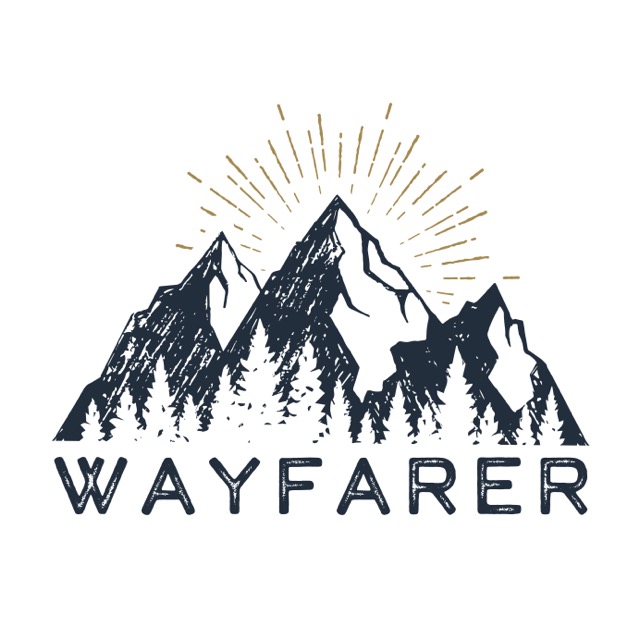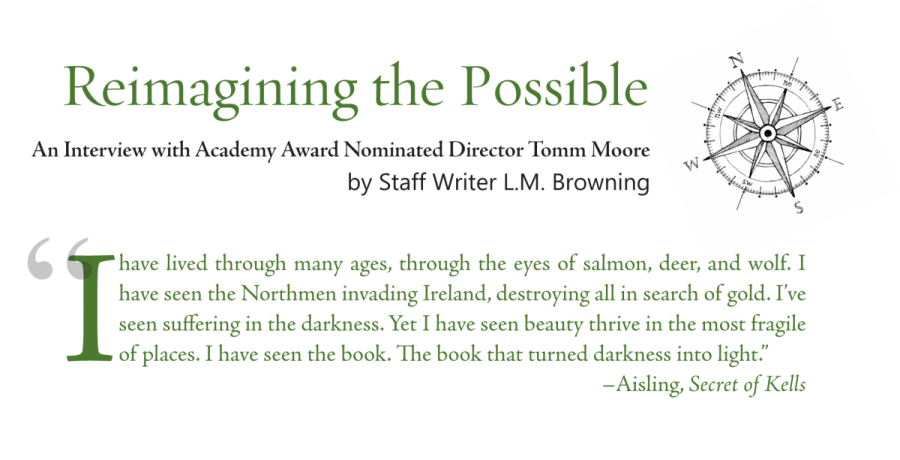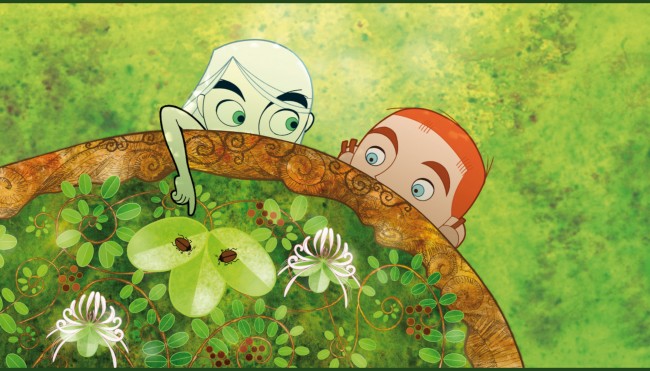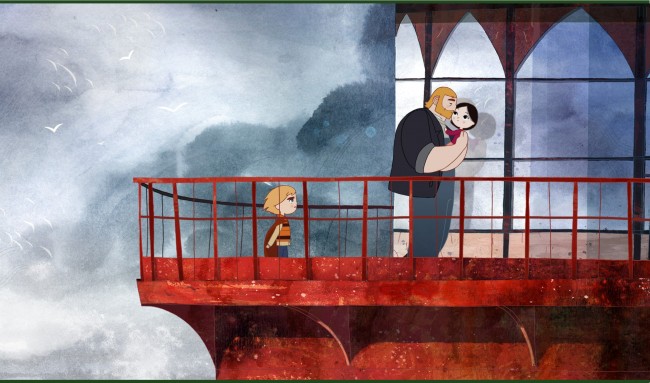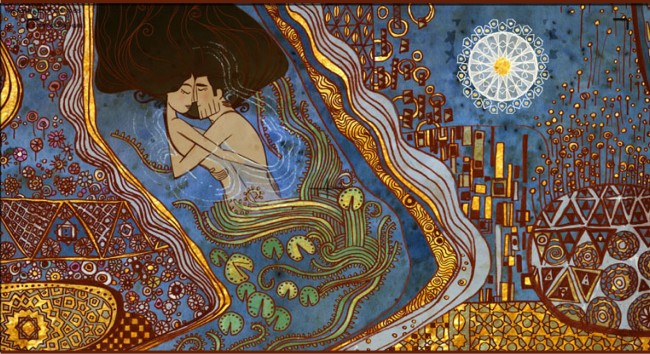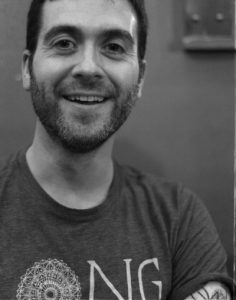 Irish illustrator, comics artist and Academy Award-nominated filmmaker Tomm Moore was born in Newry, County Down, in Northern Ireland. During his final year at Ballyfermont College in Dublin, Moore co-founded the Cartoon Saloon animation studio. Moore’s first animated feature film, which he co-directed with Nora Twomey, was The Secret of Kells, written by Fabrice Ziolkowski from a story by Moore and Aidan Harte. The film premiered on February 8, 2009 at the Berlin International Film Festival. It went into wide release a few days later and then, on February 2, 2010, it was announced that the film had been nominated for the Academy Award for Best Animated Feature Film. In 2014, Moore released his second feature film, Song of the Sea. As with Secret of Kells, it is traditionally animated and is based on Irish folklore. The film was a major success and was also nominated for the Academy Award for Best Animated Feature Film.
Irish illustrator, comics artist and Academy Award-nominated filmmaker Tomm Moore was born in Newry, County Down, in Northern Ireland. During his final year at Ballyfermont College in Dublin, Moore co-founded the Cartoon Saloon animation studio. Moore’s first animated feature film, which he co-directed with Nora Twomey, was The Secret of Kells, written by Fabrice Ziolkowski from a story by Moore and Aidan Harte. The film premiered on February 8, 2009 at the Berlin International Film Festival. It went into wide release a few days later and then, on February 2, 2010, it was announced that the film had been nominated for the Academy Award for Best Animated Feature Film. In 2014, Moore released his second feature film, Song of the Sea. As with Secret of Kells, it is traditionally animated and is based on Irish folklore. The film was a major success and was also nominated for the Academy Award for Best Animated Feature Film.
You are a man of many talents: Illustrator, comics artist, filmmaker, and entrepreneur, but at the heart of it all you are a storyteller. Where did that path begin for you? When did you know you wanted to be a storyteller?
Thanks. I always knew I wanted to be a visual artist of one kind or another. I was always making comics and storybooks as a child, but to be honest the stories existed primarily to house the drawings I wanted to do, and I think my primary interest or ambition was on the art side when I was younger—or at least I never thought to separate the two.
When I joined Young Irish Filmmakers here in my hometown of Kilkenny I learned about the structure and subtext of my favorite films and began to think more in terms of narrative. But I have to admit that even early in my career I was often more focused on the art and mechanics of animation than the story per se.
I came to realize however that storytelling , which I almost took for granted was the heart of anything I wanted to do , and as I got more interested in myth and fairy tales I realized that narrative and stories are at the heart of who we are as a species. I believe that storytelling pervades our lives and how we think of ourselves and that storytelling and metaphor have formed our cultures, our societies and religions. But I must confess that I still feel very much a beginner in understanding story, writing, and all the craft that goes with that. I’ve only dipped my toes in that water and have been incredibly lucky to have had collaborators much more naturally talented and experienced in that area than myself.
In 1998, you co-founded the Cartoon Saloon animation studio in Kilkenny, Ireland with Paul Young and Nora Twomey. You could have taken a position with another studio but instead you decided to go off on your own and start something from the ground up. What was the motivation behind that choice? Was it simply to maintain creative control over your work or was it something more?
Again, it’s only in hindsight that I can see what a bold choice that was in many ways. At the time the options in Ireland were quite limited, the American studios that had been based in Dublin had all left and we faced either emigrating to find work or setting something up ourselves.
The spirit of independent production I had learned at Young Irish Filmmakers served me well and indeed they gave us space in their building to get started as well as helping us find some initial grants and funding.
In our naiveté and optimistic youthful minds we felt we could make our own films for a few years and then go off and get “real jobs”. 16 years later it has become our “real job” and I can’t really imagine doing anything else.
We work on tiny budgets compared to our friends in the bigger studios but in exchange for that there is an enormous artistic freedom that I’ve come to value. Never having worked in another studio, I can’t really compare but my friends there tell me I’m “living the dream”. I am lucky in having such strong partners and we have managed to create the environment we dreamt of all those years ago, where I feel I am learning every day and I imagine the other directors coming up behind me in Cartoon Saloon will do some amazing work in the years to come.
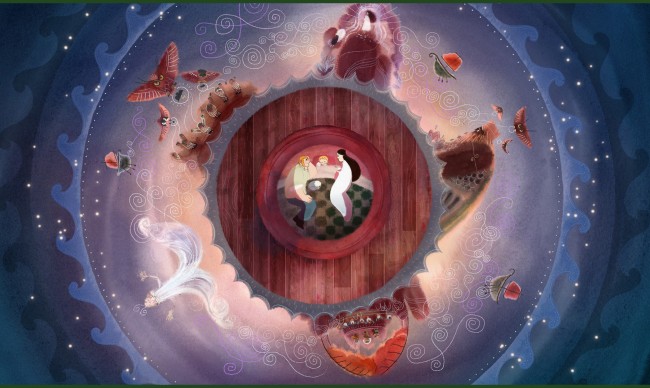
You’ve won countless awards for your body of work thus far: The National Cartoonist Society Reuben Award, the European Animated Feature Award, the Audience Award at the Edinburgh International Film Festival , the Irish Film and Television Awards for Best Film, two nominations for Best Animated Feature Film at the Academy Awards…the list goes on. How if at all has this level of success effected how you approach your work?
It’s nice to have the recognition and I suppose it gives us a kind of “professional armor” when approaching partners and funders. Certainly it has helped put us on the map and given us the courage to keep going even when the financial side of things has been more challenging. But in terms of how I approach my own work it hasn’t really changed much except to keep me nervous to make the next project as strong as I can, knowing that it will be compared to our past successes could be paralyzing—the fear that it was all just a fluke never seems to go away!
What was your reaction when you learned Secret of Kells had been nominated for the Academy Award?
It was a big surprise , we really had no expectations at all. But once the shock died down I was enormously grateful to the Academy members who had recognized our efforts, since most of my twenties had gone on trying to make that film , and I had convinced so many talented people to come onboard over the years, it was a fantastic validation of their work and the trust that our crew and partners had shown me.
In a world of computer animation, hand-drawn films such as Secret of Kells and Song of the Sea stand out as authentic and soulful. What compelled you to stay true to the traditional hand-drawn animation?
![]() There are two main reasons for me: One is that simply I enjoy the process , I like to draw and spend my day around artists who inspire me and have the same passion for the medium I do. I feel comfortable directing in that medium, I feel like I know how to get the best from artists when I have some knowledge of their process and challenges. And I feel comfortable in directing on a lower budget film when I understand the process intimately enough to be able to design the project from the ground up with those limitations in mind.
There are two main reasons for me: One is that simply I enjoy the process , I like to draw and spend my day around artists who inspire me and have the same passion for the medium I do. I feel comfortable directing in that medium, I feel like I know how to get the best from artists when I have some knowledge of their process and challenges. And I feel comfortable in directing on a lower budget film when I understand the process intimately enough to be able to design the project from the ground up with those limitations in mind.
The second reason is that I believe hand drawn animation is linked to an older tradition of visual art and illustration that is relatable and recognizable universally and to all ages in a way that CGI is not. However, I think that CGI animation is exciting and the right choice for many projects. And I should be clear that computers play a big part in our process, we simply could not make these films for the budgets we do without the help of computers but the final look we aspire to is one that supports rather than supplants the handmade aesthetic. I feel like hand drawn animation exists in an ageless space that CGI cannot, as CGI is constantly being improved and built upon, the older films look more dated more quickly. I always think if we watch Bambi or any of the hand drawn classics from around the world today they look as fresh and vital as ever and for the types of stories I have been interested in telling so far that timeless organic aesthetic seemed appropriate.
![]() In both Song of the Sea and Secret of Kells there is a thread of old world magic. Do you find yourself drawn to the old wisdom? What inspires you to integrate the old ways and philosophies so heavily into your films?
In both Song of the Sea and Secret of Kells there is a thread of old world magic. Do you find yourself drawn to the old wisdom? What inspires you to integrate the old ways and philosophies so heavily into your films?
I have always been interested in how our stories and beliefs evolve and build on each other. I love the sense of connection through history that can come from mixing the old with the new and looking to the past for wisdom. I think maybe in Ireland this connection to the past has been lost a little bit and I wondered if the truths at the heart of the folklore and songs were being packaged up for tourists but not really absorbed by the people living here. At least that was how I felt when I was developing those projects but I am much more hopeful now, I feel a rebirth or reawakening and appreciation of those things now, and of course in another sense every story is built on older ones, particularly the ones that resonate and last thru the generations. I hope to communicate an appreciation and curiosity about those aspects of our shared culture in my films.
In 2014, you co-directed a segment of the Salma Hayek produced film The Prophet, adapted from Kahlil Gibran’s book, The Prophet. Tell me, what was it like being a part of that project. Was it daunting to approach adapting such a beloved classic?
![]() It was a little scary to be honest, not just because the book was so well loved but because the team of directors that had been assembled for the production were some of the best in the field. Roger Allers who was tasked with the overall direction was a great guiding force and helped us find the heart of the poem we picked and gave us great freedom in our interpretation of it. Also we made it at the same time as Song of the Sea so it was quite an intense period of production for us , but with my co-director Ross Stewart and a great crew we pulled it off and I am very proud of the result. We managed to dig deep into our own life experiences and to somehow channel our love of North African Islamic Art and the paintings of Gustav Klimt into the final 5 minute piece.
It was a little scary to be honest, not just because the book was so well loved but because the team of directors that had been assembled for the production were some of the best in the field. Roger Allers who was tasked with the overall direction was a great guiding force and helped us find the heart of the poem we picked and gave us great freedom in our interpretation of it. Also we made it at the same time as Song of the Sea so it was quite an intense period of production for us , but with my co-director Ross Stewart and a great crew we pulled it off and I am very proud of the result. We managed to dig deep into our own life experiences and to somehow channel our love of North African Islamic Art and the paintings of Gustav Klimt into the final 5 minute piece.
![]() In the autumn of 2015, you announced on your social media that your next feature film will be entitled Wolfwalkers. Give us a little insight into that project and what’s next for you.
In the autumn of 2015, you announced on your social media that your next feature film will be entitled Wolfwalkers. Give us a little insight into that project and what’s next for you.
We are still writing it now and it seems to be shaping up well. I’m excited to explore the time period it’s set in, around 1645, when Cromwell was trying to “tame” Ireland by eliminating the wolves from the countryside. We are working with folklore from that period and playing with themes stemming from that conflict between a strict puritan point of view and the other belief systems of the time. I feel it continues to be a struggle today on personal and cultural levels, that dynamic between the wild and natural and our need for control and discipline. It also touches on themes of friendship and childhood and how our friends often define who we become as much or more than our parents.
Finally, what advice do you have for all those artists and writers out there struggling as they attempt to pursue their passion as their profession?
The best advice I ever got was to keep showing up, not just to keep showing up to your work even when you don’t feel like it, but to keep reaching out and making connections. Whatever area you are in it’s important to meet the other people involved, to share and show your work, to sort of state your claim that this is what you are doing, and what you are aiming for and in that way you create a community to support you and you create a sense in yourself that you are not struggling alone and that you owe it to your peers to complete what you set out to do. I think that’s been really important for me, as the connections and friendships I have made by stepping out with our work have led me all around the world and continue to be a great source of learning and advice.
The following interview appears in the Spring 2016 Issue of The Wayfarer. Order a print or the full e-edition here»
• • •
 L.M. Browning
L.M. Browning
L.M. (Leslie M.) Browning grew up in the small fishing village of Stonington, Connecticut. In her writing, Browning explores the confluence of the natural landscape and the interior landscape. A proud native of New England, she travels often throughout the region using her photography, drawing, and writing to explore the ecological and cultural identity of the Northeast. She is the author of numerous award-winning titles. Balancing her passion for writing with her love of learning, Leslie sits on the Board of Directors for the Independent Book Publisher’s Association. She is a graduate of the University of London and a Fellow with the International League of Conservation Writers. She is partner at Hiraeth Press; Co-Founder of Written River as well as Founder and Editor-in-Chief of The Wayfarer. In 2011, Browning opened Homebound Publications. She is currently working to complete a B.A. in Liberal Arts at Harvard University’s Extension School in Cambridge, Massachusetts. • Go to Author Page›
The Wayfarer is released biannually each spring and autumn. We offer approximately 60% of each issue free to the public on our website. If you find yourself inspired by what you read here and would like to enjoy a full issue, you have a few options.
♦
Print Edition: Individual print editions starting at $8.99 are available in our bookstore. Each print edition is full-color, perfect bound and printed on paper with chain of custody certification from the Forest Stewardship Council, Sustainable Forestry Initiative, and the Program for the Endorsement of Forest Certification. • Our Shop»
Full e-Edition: Complete e-editions are also available in our bookstore. In mere minutes and for less than a cup of tea you can be downloading the full PDF to your computer or favorite device. • Our Shop»
Print Subscription: We offer subscriptions to the print edition. When you subscribe to the print edition, you also receive the e-edition free! With each release, we will send you your copy of the print edition while at the same time sending you a secure link via email for you to download your e-edition! • Learn More»
e-Edition Subscription: If you are just interested in receiving the e-Edition, a 1yr e-subscription is the right step for you. For only $2.99 you can receive 2 issues of The Wayfarer’s e-Edition. Each spring and autumn, you will wake up to find a fresh issue of the journal waiting in your inbox. Download the PDF to your computer or favorite tablet device. • Learn More»
To bring each issue of The Wayfarer to fruition, it takes hundreds of hours each season to craft, edit, design, and distribute the journal. If you find joy and enrichment within our features, please consider becoming a supporter with a small donation. There is no set amount. Whether it is .99 or a few dollars, we appreciate any gift you care to give. While at this time we are not a non-profit all donations do go towards ensuring the future of the journal.
